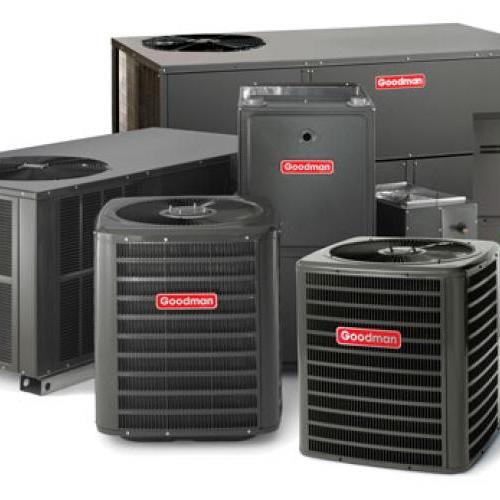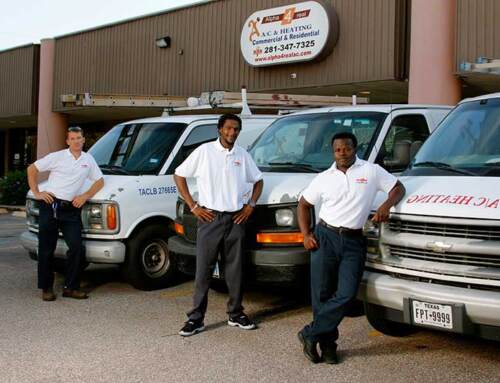
By Bright Ashaka
Alpha 4 Real AC & Heating Service, Katy, TX
How long does an air conditioner last in Katy, TX? As a homeowner, this is a question you will find yourself asking at some point. After all, your AC system is one of the most expensive systems in a home.
It’s only natural to be concerned about how long it should last, whether you’re planning to purchase your first unit or wondering whether to call your Katy TX AC heating repair contractor or replace your existing AC.
The average lifespan of a residential air conditioner is 10 to 15 years. However, how long your AC system will actually last comes down to a number of factors.
Keep reading to learn what determines the life expectancy of a residential air conditioner and how you can tell whether a unit is nearing the end of its lifespan.
How Long Does a Residential AC System Last?
Here are factors that determine how long your residential air conditioner will last.
- Whether the Unit Is the Correct Size for Your House
- Whether the Unit Was Installed Properly
- How Well the Unit is Maintained
- Whether It’s a Traditional or Modern Unit
- How Much and How Often You Use It
- How Often You Change the Thermostat Setting
On average, air conditioners last 10 – 15 years. However, air conditioner life expectancy varies greatly based on a number of factors including where you live and how well you maintain it. Some AC units will only last 10 years while others can last as long as 30 years.
Why Do Air Conditioners Only Last 15 Years?
The average life of air conditioners is shorter than that of furnaces for one reason.
Unlike furnaces, air conditioners are located on the outside of the house where they are exposed to harsh elements and really take a beating.
While furnaces can last 15 to 20 years on average, air conditioners typically only last 10 to 15 years.
What Determines the Life Expectancy of a Residential Air Conditioner?
Not all air conditioners reach their expiry dates at the same time. Your AC unit can expire before the average lifespan or outlive it. Let’s take a look at the factors that will determine how long your AC unit will last.
1. Whether the Unit Is the Correct Size for Your House
Size impacts the life span of your HVAC unit. If your AC unit is not the right size for your house, it will fail before its expected time.
Too large and it will have many short cycles. Too small and it will run for a long time risking its components overheating. Always ensure the AC unit you get is properly sized for your house.
2. Whether the Unit Was Installed Properly
Whether your AC will fulfill its expected lifespan depends on whether it was installed properly. Hiring a certified AC and furnace installation professional in Katy, TX, that’s trained in installing air conditioners can ensure your air conditioner lasts long.
If you go the DIY route or hire a less than qualified contractor, incorrect installation can cause the system to fail sooner. For example, careless wiring can result in faults and damage to the system.
3. How Well the Unit is Maintained
Like any other mechanical device, air conditioners last longer with proper maintenance. Staying on top of the maintenance schedule is the best thing you can do to prolong the life of your cooling system.
Proper and comprehensive maintenance can prolong the life expectancy by 25% or more. Clean or replace your air filter every three months, remove debris regularly, and hire a professional HVAC contractor to maintain all components.
4. Whether It’s a Traditional or Modern Unit
Air conditioners have come a long way since their invention and keep getting better year after year. Technological advancements have extended their average life expectancy.
Modern AC units can last between 15-20 years without losing their efficiency while older models last around 9-12 years.
5. How Much and How Often You Use It
How often and how much you use the AC will also affect its working life. Do you have your air conditioner on 24/7? Then expect it to reach the end of its life sooner. Heavy usage and long operating hours increase wear and tear and shorten the lifespan of an AC system.
Your preferred temperature will also determine how hard the AC has to work and how fast it will fail. The AC will run a lot more frequently when set at 70⁰ F than it would if set at 78⁰ F.
You can reduce the strain on your unit and increase its longevity by using it only when you really need it. Work to improve the insulation in your home and make use of ceiling fans and dehumidifiers.
6. How Often You Change the Thermostat Setting
Of course, your thermostat settings need to be changed according to the season and time of the day. However, changing the thermostat setting too frequently or maintaining the same temperature can stress your system and increase wear and tear.
See also: 24-Hour Same-Day Emergency Air Conditioning Repair in Katy, Houston, TX.
To extend the life of your AC, program the smart thermostat or a smart AC controller to automatically switch the unit off when the ideal temperature and humidity levels are achieved.
Where You Live
The life expectancy of an AC also depends on the climate and other environmental factors. If you live near the coast, the salty sea air can take a toll on the outdoor unit and shorten its lifespan. And so can corrosive chemicals in the air.
Air conditioners installed in northern states have longer lifespans. They can last 20-40 years. This is because their usage level is lower and they go through fewer start and stop cycles than ACs in warmer and more humid locations.
Signs That Your Residential Air Conditioner is Nearing the End of Its Life
- Your AC Unit is More Than Ten Years Old
- Your AC Unit Frequently Breaks Down and Requires Repair Often
- Your Energy Bill Has Increased Without Reason
- Your AC Unit’s Compressor Break Down

It’s More Than Ten Years Old
At 10 years, an AC unit has passed two-thirds of its expected lifecycle and is approaching the end of its lifespan. If you’ve had your unit for more than a decade, you should start getting ready to replace it, especially if it’s now exhibiting the following symptoms.
It Frequently Breaks Down and Requires Repair Often
When an air conditioner is nearing the end of its life, it starts to break down frequently. If your A/C has multiple breakdowns and you have to rely on 24-hour AC repair often despite exercising proper care and maintenance, you have a reason for concern.
Instead of pumping more money into HVAC repair and heating service in Katy, TX, it might be time to let it go and replace it with a new unit.
Your Energy Bill Has Increased Without Reason
If you haven’t made changes to your home’s energy use but you’ve seen a substantial increase in your monthly energy bill, your old AC unit could be the culprit.
The older an air conditioner is, the higher its energy consumption. As an AC unit ages, it starts losing its seasonal energy efficiency ratio (SEER) value and draws more power.
The Compressor Break Down
The compressor is the heart of an AC system. It is responsible for compressing the refrigerant and pumping it through the cooling system. As such, an AC unit cannot function without it.
The good news is that the compressor is unlikely to fail before an air conditioner fulfills its expected lifecycle.
Once it fails, however, the life of your AC is cut short. Since the compressor is too expensive to replace, it’s more cost-effective to let go of the old system and purchase a new AC.
As you can see, there’s no one standard answer to how long all residential air conditioners should last whether you live in Katy, Houston, Sealy, Richmond, Rosenberg, Missouri City, Pearland, or Stafford, TX.
The average life expectancy of an AC unit is 10-15 years. However, how long your AC unit will last comes down to a number of factors including where you live, your usage pattern, and whether you’re on top of heating and air conditioning furnace service and maintenance.
The best way to tell whether your air conditioner has reached the end of its life is to monitor its energy usage and performance. Does the system rattle, grind, grate, or whine during operation? Does it keep breaking down? Has its effectiveness and efficiency gone down?
These are all signs that your air conditioner needs replacement instead of AC repair in Katy TX. Call the Katy AC repair pros today.

